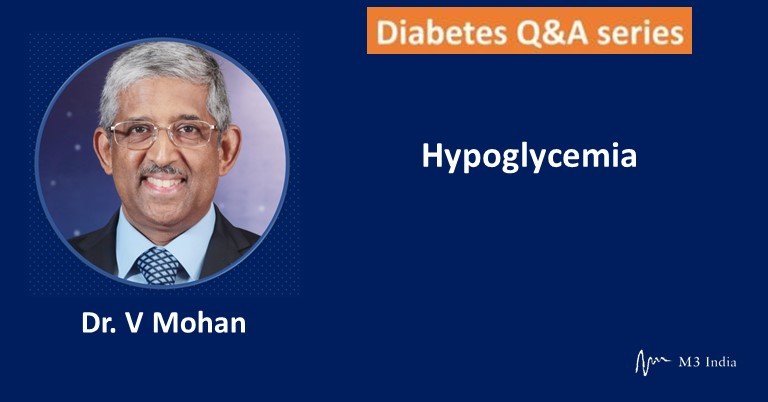Q&A with Dr. V Mohan: Hypoglycaemia & low blood sugar reactions
M3 India Newsdesk Jun 04, 2020
Dr. V Mohan answers questions posted by readers on the previous article- Hypoglycemia & low blood sugar reactions.

Question 1: Please elaborate on the management of nocturnal hypoglycaemia?
Dr. V Mohan: Nocturnal hypoglycaemia can be managed by, first of all, looking for it. This can be done by doing a self-monitoring blood glucose (SMBG) at 3 or 4 am, when the sugar tend to drop and the lowest point or the nadir of the blood sugar is reached. If the sugar is to be found low at that time, the dose of the night anti-diabetic drugs, either tablet or insulin can be reduced. We can also take a snack after dinner to prevent nocturnal hypoglycaemia. With the advent of ambulatory glucose profile (AGP) and continuous glucose monitoring (CGM), one can monitor for nocturnal hypoglycaemia much better and thereby prevent it.
Question 2: How can one manage hypoglycaemia in comatose patients with DM?
Dr. V Mohan: If the patient is comatose, intravenous glucose has to be administered. Dextrose (25%) is normally given and immediately after this we should be able to reverse the coma in a patient with hypoglycaemia. This should then be followed with a continuous infusion of glucose for some time, after which the dose of the medicine should be reduced. Injection glucagon intra muscular can also be used in situations where the IV glucose cannot be given.
Question 3: How should we manage hypoglycaemia in a stroke patient ?
Dr. V Mohan: It is important to avoid hypoglycaemia on a stroke patient as it can make the stroke condition worse. Hence, all precautions must be taken to either avoid hypoglycaemia or to correct it immediately in all stroke patients. One method would be to keep the sugars higher than normal at a safe limit, so that there is no chance of hypoglycaemia.
Question 4: Is there any interesting data on hypoglycaemia and glucometer; any trends to pick up?
Dr. V Mohan: Glucometer can help to detect asymptomatic hypoglycaemia or hypoglycaemia unawareness. Hence, doing blood sugar tests using a glucometer at different times of the day, e.g. by using a 5-point or 7-point profile throughout the day can help to pick up hypoglycaemia and prevent it.
Question 5: Many non-diabetic patients experience hypoglycemia and associated problems. How can a doctor approach such cases?
Dr. V Mohan: There is a condition known as reactive hypoglycaemia in which the sugar levels tend to drop 3 to 4 hours after a meal. Such people need not have diabetes. By having small frequent feeds this hypoglycaemia can be prevented. There could be other causes of hypoglycaemia due to some rare tumors etc. If we are not able to find a definite cause, then one should start systematically looking for and ruling out various causes of hypoglycemia so that they can be treated.
To read articles published in the series, click,
Treatment algorithm; factors to consider while prescribing medication: Dr. V Mohan
Diabetes Q&A with Dr. V Mohan: Treatment algorithm for DM
Managing hypertension in diabetic patients: Dr. V Mohan
Diabetes Q&A with Dr. V Mohan: Managing hypertension in diabetic patients
Diet and Diabetes: Dr. V Mohan
Exercise & Diabetes by Dr. V Mohan
Q&A with Dr. V Mohan: Exercise and Diabetes
Diabetes and kidney disease: Ask Dr. V Mohan
Exclusive series: Hypoglycemia & low blood sugar reactions- Ask Dr. V Mohan
Being a part of this exclusive series allows you to post a question for Dr. V Mohan. Answers will be published in the next article in this monthly series.
Disclaimer- The views and opinions expressed in this article are those of the author's and do not necessarily reflect the official policy or position of M3 India.
The author, Dr. V Mohan is the Chairman & Chief of Diabetology at Dr. Mohan’s Diabetes Specialities Centre & Madras Diabetes Research Foundation, Chennai, India.
-
Exclusive Write-ups & Webinars by KOLs
-
Daily Quiz by specialty
-
Paid Market Research Surveys
-
Case discussions, News & Journals' summaries